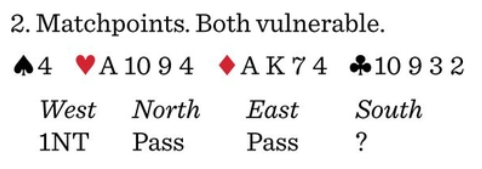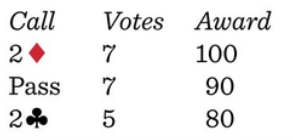
What’s your call?
| 2♣ | 2♦ | 2♥ | 2♠ | 2NT |
| 3♣ | 3♦ | 3♥ | 3♠ | 3NT |
| 4♣ | 4♦ | 4♥ | 4♠ | 4NT |
| 5♣ | 5♦ | 5♥ | 5♠ | 5NT |
| 6♣ | 6♦ | 6♥ | 6♠ | 6NT |
| 7♣ | 7♦ | 7♥ | 7♠ | 7NT |
| Pass | Dbl |
Note: Bridge Bulletin Standard versus 1NT opener: Double = single-suiter; 2♣ = clubs and another suit; 2♦ = diamonds and a major; 2♥ = majors; 2♠ is natural but weaker than double followed by 2.
Whether to act over opponent’s opening notrump and if so, which two suits to lay claim to (both of which will be shorter than partner expects)? In the scoring, Walker broke the 7–7 tie in favor of bidding.
Meckstroth tosses a coin and it comes down 2♦ . “I don’t like the probable spade lead versus 1NT.”
2♦ from Boehm. “Let’s live a little — it’s only matchpoints.”
2♦ from Sanborn, who has a plan to show all three of her suits if the auction permits. “Over 2 I can try 3 and pray. I know what lead is hitting the table if I don’t bid.”
2♦ from Kennedy. “Pass doesn’t seem right.”
2♦ from Hampson. “I will show two of my suits and get a lead director in on the off chance that left-hand opponent bids 2♠ (which I will double for takeout).”
“Pass is not on the agenda,” says Rigal, who bids 2♦ . “I prefer to bid good suits rather than bad.”
The Gordons pass, demanding, “Where are the spades? If partner has them, he probably has a bad hand. If the opponents have them, they have a better spot to play.”
Robinson passes. “There’s no guarantee we’ll find our best spot. If I bid 2♣, then partner has to bid 2♦ with 4=4=3=2 or pass 2 with 5=4=2=2.”
The Sutherlins pass, too. “We are vulnerable in front of the strongest hand, playing methods that may or may not let us find a possible eight-card fit. Why get involved?”
“It goes against the grain to pass,” lament the Coopers, who pass, “but we expect that if we bid, we’ll either end up playing a 5–1 or 6–1 spade fit or we’ll see the enemy find their 4–4 or 4–5 spade fit. If we weren’t vulnerable, the case for bidding would be much stronger.”
Meyers explains her 2♣: “It is the animal in me.”
Cohen starts with 2♣. “The colors make it tempting to pass (because plus 100 is better than plus 90 and minus 90 is better than minus 100). I can’t change my stripes, however; I am programmed to balance when it goes 1NT–Pass–Pass and I hold 13 cards. In this case, I would not enjoy watching partner lead a spade against 1NT. As to 2♣ … safety first. I look for any playable fit by starting with my cheapest suit.”
“To pass is inconceivable,” says Colchamiro, citing Colchamiro’s Rule of 2, “and to exclude clubs is not smart.”
Lawrence believes that passing 1NT with a singleton someplace is generally a disaster. He chooses 2♣.
Falk also bids 2♣. “When I’m competing with four-card suits, I need to broaden my possible safe landing zones to include as many strains as possible. When partner has:
♠K x x x x ♥J x ♦ J x ♣J x x x,
I’ll be happy I got him off the spade lead and found clubs. If he has more, I’ll be happier still.”


